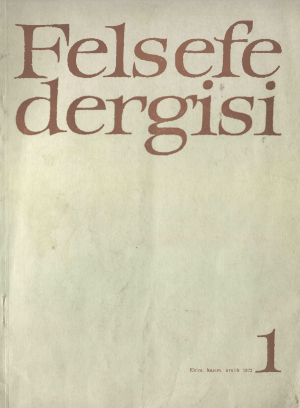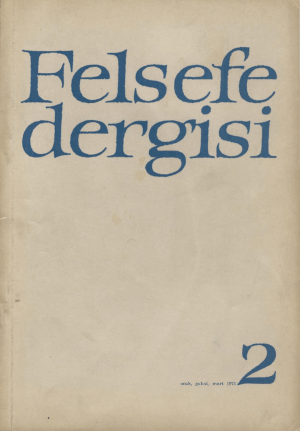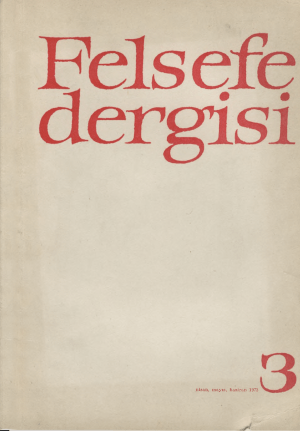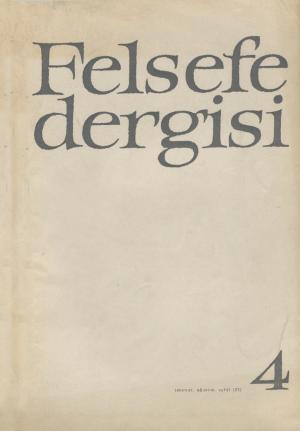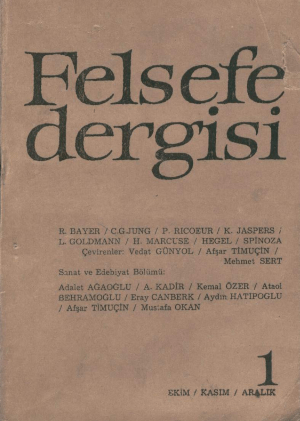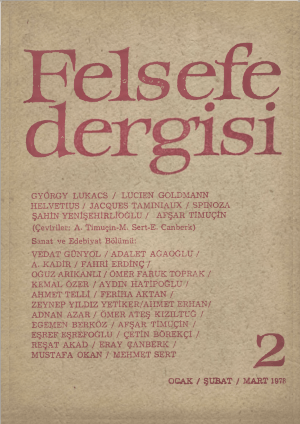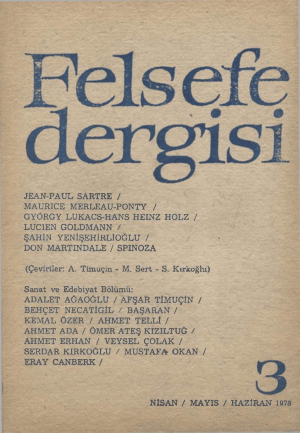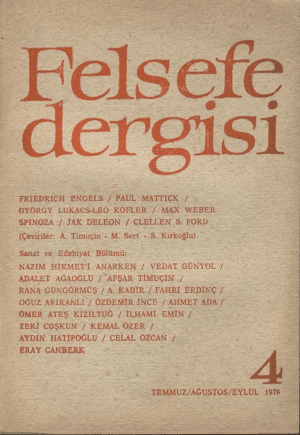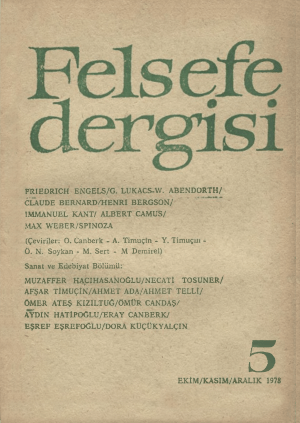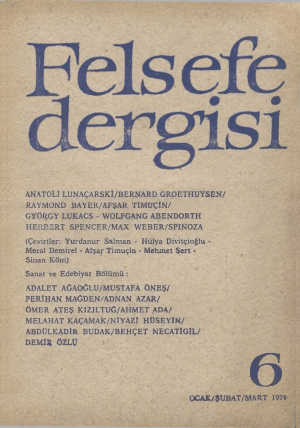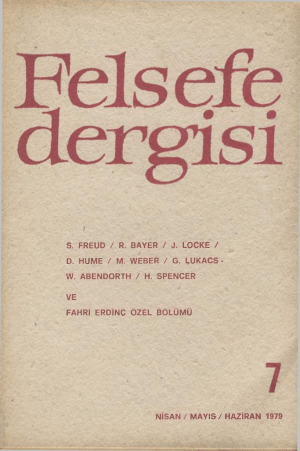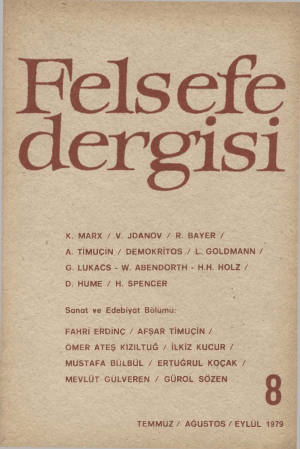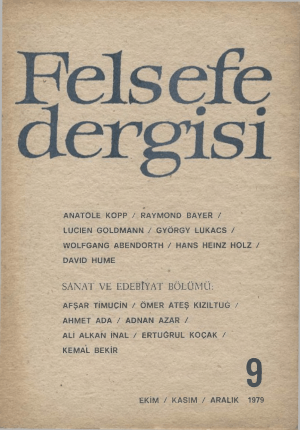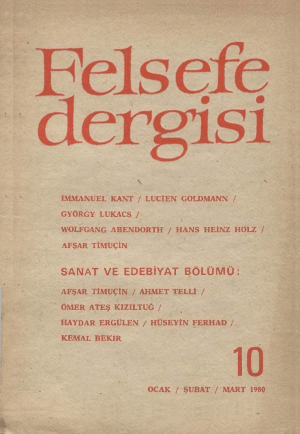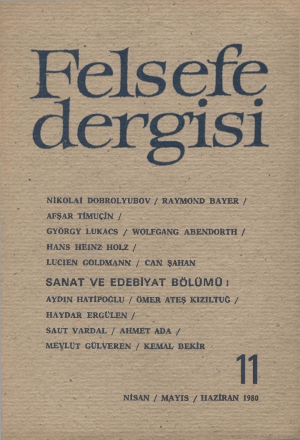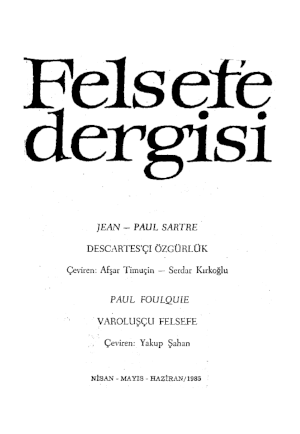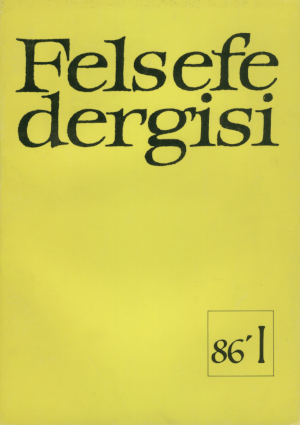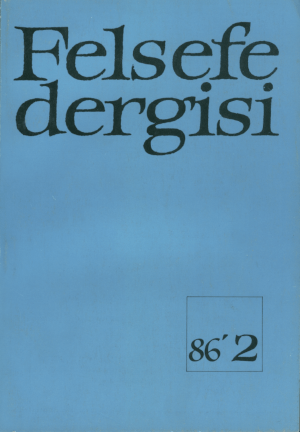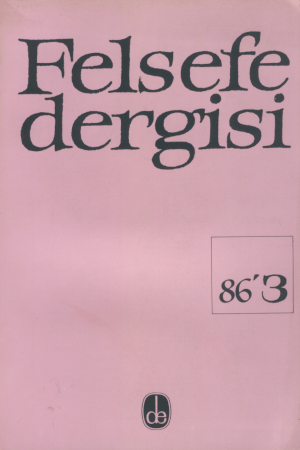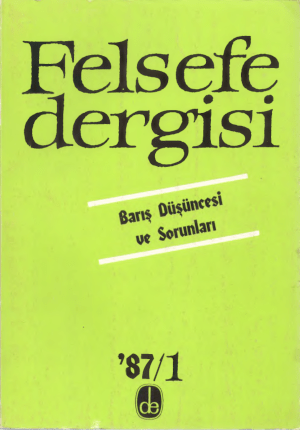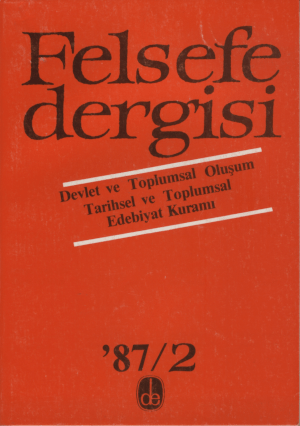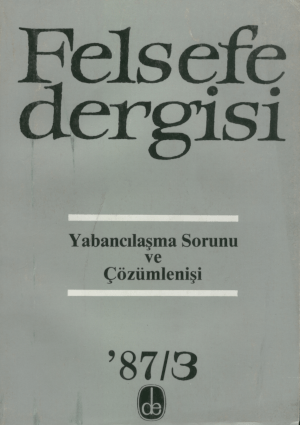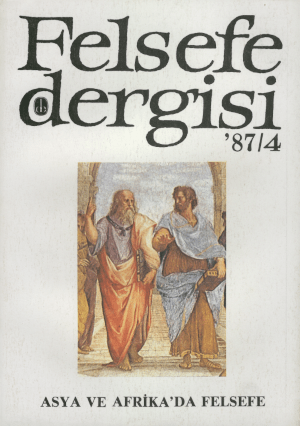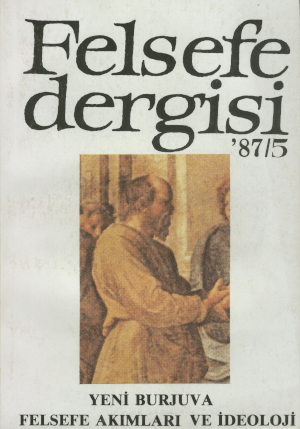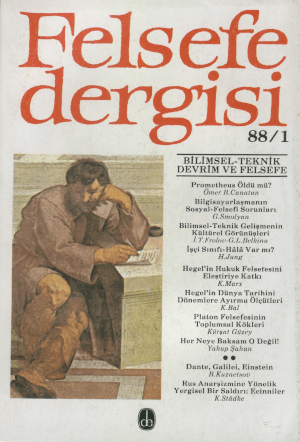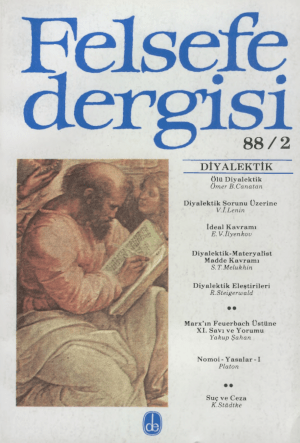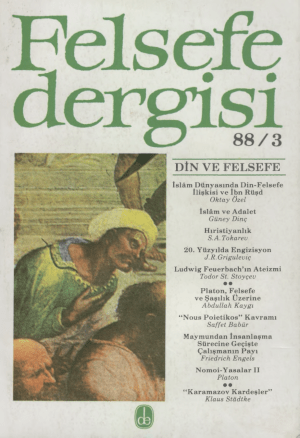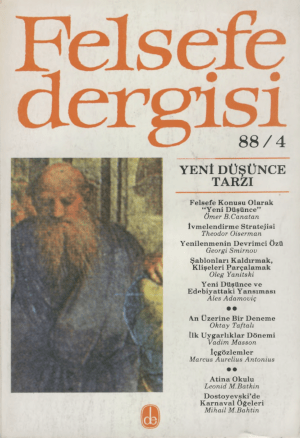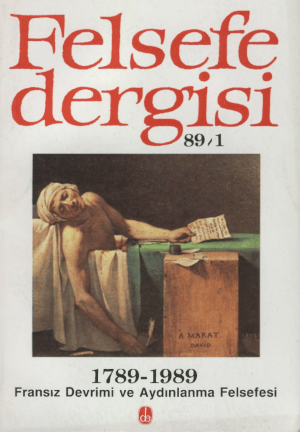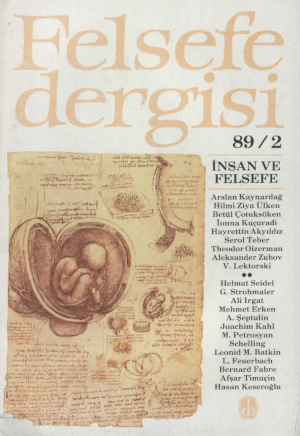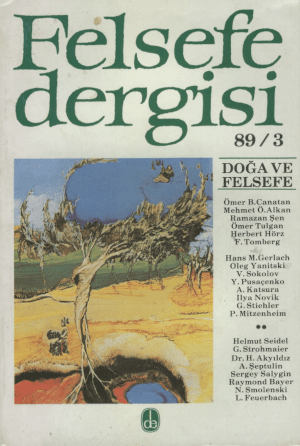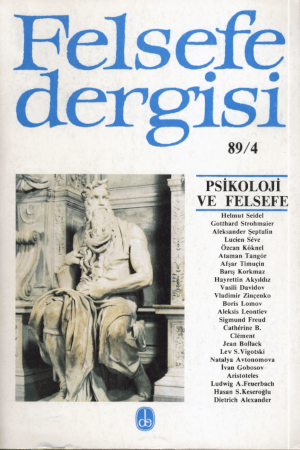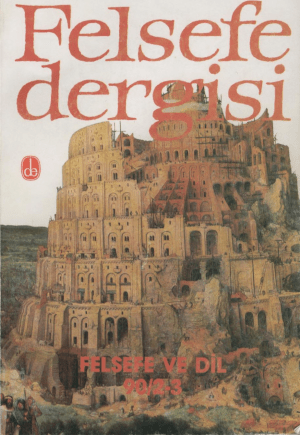The Journal of Philosophy is restarting its publication life after a 31-year hiatus. In December 1972, Prof. Dr. Philosophy Magazine, which started its publication life under the management of Afşar Timuçin, was founded in 1980 by the September 12 military closed by the blow. It was published in June 1986 under the editorship of Aziz Çalışlar. After Çalışlar's death, the Journal of Philosophy started again in 1990 under the editorship of Oğuz Özgül. until it continued. Finally 32./33. number has been published.
After a long hiatus, we published its new issue, both in print and digital, open to everyone this year. The Journal of Philosophy, which we plan to publish, aims to contribute to the enrichment of the Turkish philosophy world. aims. In addition, online and/or face-to-face national and international conferences, symposia and It will organize workshops and discuss the problems of philosophy and sciences through different channels. It will also offer the opportunity to make publications in different languages on the subject.
Although it has continued its broadcasting life with interruptions and has stopped broadcasting for the last 31 years, it is in Turkish. Philosophy Journal, which has given great service to philosophy, celebrates its 50th anniversary in March next year. will celebrate. Turkish philosophy Macit Gökberk, Selahattin Hilav, Uluğ Nutku, Great founding names such as Afşar Timuçin actively participated.





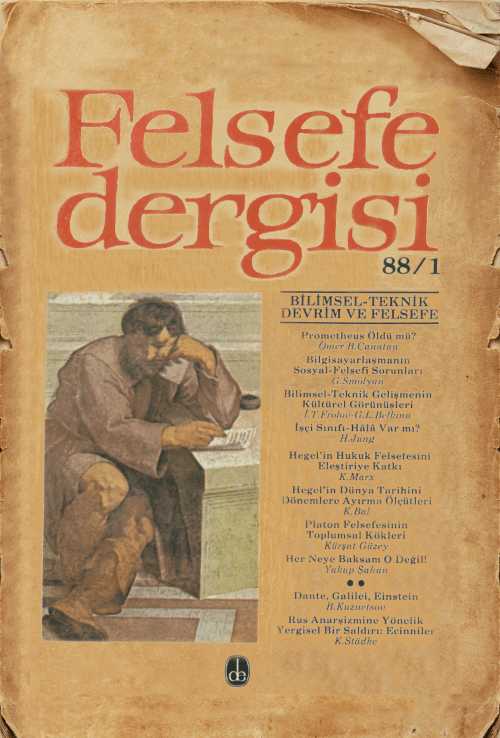
Accumulating since the Tanzimat The legacy of Turkish philosophy began to take shape with the philosophical effort put forth in the 20th century. philosophy While republishing the magazine, we want to embrace and deepen this founding legacy. The Journal of Philosophy added value and meaning to its publication life with the great economic, political and ecological crisis. In a period marked by the crisis, they were deprived of their necessary means of subsistence, that almost all people, including workers, producers, are faced with the struggle for existence. conditions again.
This crisis, experienced in the first quarter of the twenty-first century, is the deepest and most serious crisis in history. It is possible to see it as one of the most general crises. With this deep and general crisis of humanity, economic, moral, aesthetic, religious, scientific, social life together; In short, human life. everything that is thought to give content and meaning, and thus human life itself, is increasingly becomes more and more worthless. It has been created by man himself in history, by going through many difficult roads. skills, talents, achievements, etc., in short, his entire existence, only profit, interest, benefit and gain. context is important. Those who can stay within this utilitarian-centered paradigm are generally it is reduced to a simple element of the system that has no essential determination, and those that fall outside almost doomed to "nothingness".

The pandemic, which has been around the world for more than a year, has made this general crisis we are in even more. made clearer and more obvious. Humanity is in danger of a great collapse arising from this general crisis. drifting towards that danger, that all living things on our planet as well as all human beings. It also concerns the future of the organism. That is why humanity today is literally a It is faced with the problem of “to be or not to be”.
Philosophy is a product of the effort of man to give a rational meaning to his existence in the universe. There has existed and behind this effort, as Hegel stated, there is a dissolution, division, dissolution in social life. there is fragmentation and isolation: philosophy is to overcome this fragmentation, to It begins to work to bring unity to the multitude that has lost or has not found its unity. General crisis of humanity Philosophy has always had its twilight, and the rebirth of humanity from the ashes is also philosophy's twilight. is the precondition for his coming back to himself. Dialectical thought, in this framework, with its age contradictions and Responsible for presenting an action perspective based on and comprehending conflicts with their inherent solution potentials. It is the most important tool of philosophy.
The reason why the current life and meaning crisis is deepening and burning is It is the collapse of unity and integrity in practice and world design. A new worldwide union and the search for unity is in question, and this situation calls philosophy to duty. But especially Turkish Philosophy has lagged far behind scientific development for the last 30 years. anti-science and mystical/theological An irrational discussion of existence and meaning has been dominated by the theories of existence.
Mythologies were also the product of a crisis of meaning. In Hesiod's own geography, all cultures the mind/logos he created within himself with the collapse of mythology, which he rationalized with a synthesis attempt. unleashed its potential. Thales, the forerunner of philosophical thought, The crisis sought is also directly related to the origin, past and future, and that it can only be showed that it can be solved based on logos. For the happiness of man, the true nature of Epicurus His demand that it should be studied is valid for almost all ancients.
The Arche question is an ontological question. The Arche question is an epistemological question. Arkhe question all practical It is a question of meaning, hence morality, of the way the world exists, that concerns our lives. Arche The question is to re-establish the unity of the collapsing multiplicity, to create a new unity and thus to the world and the world. It aims to give a new meaning to life. Athenian classical systems of philosophy are at the forefront of this quest. creates the moment. While Aristotle synthesized the entire ancient discussion with an encyclopedic view, its existence formation has been constructed as both continuity and rupture, according to which multiplicity and unity are ontological. it is a must. Knowledge as the knowledge of being, the realistic epistemological construction of the ontological process. has been revealed. In our age, in the ontological fiction of existence in philosophy, the ancient mental labor has reached It is impossible to fall behind this level.
Descartes' suggestion that the existence of everything that exists in the universe depends on the existence of everything is Stoic. Although it is an approach, it forms a basis for the scientific modern world view. With the Copernican Revolution based on the heliocentric design of the world, and thus the idea that man is privileged in the universe. The myth based on the creation myth has come to an end.

Man is a part of nature, just like all other things that exist. consists of a part. Of course, it should be noted right away that man, as Marx pointed out, From the moment it started to produce its means of subsistence, it has been able to differentiate itself from other natural beings and He was able to get out of his immediate situation and create himself as a human being in history. In this way, from the can gain objective realistic meaning and give him perspective on other living things and nature. It has the capacity to add meaning by considering its needs. Galileo Galilei's A moving universe replaces the Scholastic static fiction of the universe by grounding the law of inertia. got the design. Thus, what is gained from the creation myth about the reason for human existence in the universe (god and anthropocentric) meaning is obsolete.
However, it should be noted that, based on this self-moving entity view, modern Within the framework of Hegel's philosophy, which is the upper moment of philosophy, the meaning of the existence of man in the universe freedom has been demonstrated. from his own inherent motive power to move himself. Being that does not need any other transcendent power, but possesses its own capacity to act. assets can exist. For this reason, human freedom is based in nature, that is, in existence. So what, Although nature functions like a subject, there is no purpose in nature. nothing for the existence of something else was not created and nothing was created for the existence of man. Because everything in nature is happening. This is the highest wisdom attained by philosophical reflection on nature in our time. to the asset an existing entity that imposes anthropomorphic features, makes it speak, and makes it say the meaning of existence. their designs are unscientific and irrational. In the conception of existence, this Spinozist approach cannot be lagged behind. The social space, relationships, actions and goals defined as second nature by the moderns is the whole. This has accumulated since Protagoras and sheds light on the conceptualization of society. Aristotelian approach cannot be lagged behind. Man's freedom is grounded in nature, but his his freedom in society needs to be founded and established by himself. Philosophy is the world design that it generalizes and constructs based on the latest scientific knowledge. It is responsible for guiding humanity towards the realization of its freedom in the world.

While modern philosophy offers a new world design, it is an effort to ground the subjectivity of the individual in its center. He turns to a synthesis of Hellenistic philosophy, which is It makes human beings both theoretical and tries to grasp it as a practical being. The moderns are the construction of humanity's freedom in the world and His theoretical understanding of the establishment of the human condition as a set of contradictions and antagonisms. carried it to the landing point. The modern human condition is the great destructive in itself by Thomas Hobbes. It has been described as a state of war with the potential for violence. Immanuel Kant's morality while determining it as a voluntary and free action area; the principle of the formal field of law that judges these acts. attention to the conflicting state of virtue and judgment, diagnosing it as punishment, not happiness. has drawn. Developing this observation, Hegel developed the modern human condition with the law of conscience of the individual and the social reveals it as the contradictory state of morality. This is the basis of the modern state, stemming from property. creates a contradiction. He sees the projection of this contradiction in terms of social relations, the overwhelming the majority of them lack the means necessary to realize themselves despite producing sees.
Adam Smith, on the one hand, dehumanizes the modern division of labor, while describing the great fight as a master-slave war as demonstrated. While Karl Marx defines time as the space in which man realizes himself, time as a measure for the remuneration of the labor-power of the working man in the bourgeois social order. The fact that its use has reversed the ontological and teleological creative function of labor. has shown. John Miller on the basis of the enslavement of man by man that the root of the problem lies in the enslavement of The enslavement of women pushed her out of the public sphere and she was sentenced to confinement in the house. has done. Mary Wollstonecraft, while grounding the publicity of women, thus at the same time brought the problem of freedom to the agenda of humanity. Friedrich Engels, on the ontology of social being determined the problem of freedom of labor and love. The solution to this problem is to decimate humanity. as the precondition for ending the wars that have been going on and establishing a lasting peace that has been desired for thousands of years. it seems.
Contemporary philosophical thought considers the main problem of the human condition as the problem of ontology of social existence. has determined. In the light of the ontology researches and discussions in the 20th century, existence The concept is closely defined. Being is henceforth no longer generally defined, but organic. It is divided into various layers as non-organic, organic and society. Making this distinction It is to show in which layer of existence the teleology emerges. According to this distinction, teleology endowed with consciousness emerges in human society. These layers are intertwined, There are mandatory transitions from one to the other. In the light of scientific knowledge, each of these layers It has its own legality.
Ontology of social being is based on this general ontology. identified as the ontology. Versatility is above all fundamental to all human practices. It shows within the framework of the ontology of labor, which is a productive and productive activity. Labor in the modern age is labor. For this reason, the liberation and liberation of labor from its paid state is the ontological and corresponds to the teleological salvation and the re-establishment of humanity.

This emancipation of social existence and the re-establishment of humanity at the same time climate and ecology the solution of the problems of art, the liberation of art from its commodified state, the alienation of morality, reversing and rearranging the relation of man with technology, in which he was reduced to a limb, and It will offer a way out to prevent the misuse of its results. Thus, man is the most well, he will be able to show his best side.
The Journal of Philosophy defines itself as formal and contextual, theoretical and practical, universal and particular at the same time. who comprehends everything as a formation, existence and extinction, thinks causally-processively-consequentially. and the great dialectical philosophy, the most comprehensive and sophisticated instrument of philosophy ever developed. sees the tradition in it and seeks to get out of the deep crisis that humanity is in by changing the world. to make a modest contribution from this perspective to the shaping of a new world design that is necessary. re-launches its broadcasting life.
